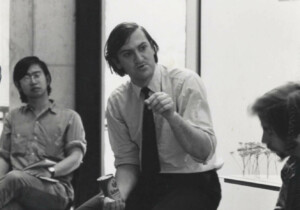To walk the streets of a city with Diane meant to be move slowly and with focus, and to often come to a complete standstill when the discussion at hand was primary over all else. This immersion was in striking contrast to her gait and quickness in the halls of Cooper Union and her brisk efficiency in the orchestration of a construction site. She lived in accord with the tenets of her practice and her teaching, and her intellectual rigor and intensity were applied to all endeavors. She believed deeply in the necessary confrontation of the existing with the ideal. The rub of dueling conditions as the source of artistic inspiration was a concept for Diane that spanned from Dante’s Divine Comedy (the introduction to our course at Pratt) to how she engaged the eccentricities of building within a given condition. To work alongside Diane on the job site was a demonstration of architecture as both an art in form and a theater piece with a unique casting call and stage directions in a whirlwind toward exquisite results. In the center was Diane, always a cutting sight in her effortless, yet careful wardrobe and its accents; the most important were her eyeglasses. She had wanted glasses since an early age and was thrilled when they became a necessity.
Diane’s ability to enjoy life was to make the best possible conditions for living, eating, thinking—whatever happened to be the pursuit of the moment. She had a gusto for food and ate with the same enjoyment and abandon as when she watered the garden at one of her many 9th street studio locations, a bit messy but with pure joy, flinging water so that it hit not only the plants but also the table she designed and the chairs and cushions. She was a talented cook and brought recipes from all over the world back to the studio, where she would regret that we did not have a dedicated chef on staff as Scarpa had when she visited his Venetian studio in the ’70s. Decades later when we visited Venice she insisted the first act must be to go immediately to Harry’s Bar, which was filled with Carnival revelers.
Wherever Diane lived it was always in a work of architecture, whether by her own hand or by selection. She would spend the summers in Long Island renting the guesthouse from Charles Gwathmey’s mother, and she lived for many years on a floor in William Lescaze’s townhouse on 48th street, where she was later married. In a metropolitan style, she had simply stopped by and made an inquiry to his widow if there were rooms for rent; Diane later designed an addition to her D.C. residence. Diane would note that she saw the principals of Hejduk’s Wall House in the Lescaze townhouse. Her intrinsic ability to see the lineages of work and continuity of thought allowed her to absorb, project, and hypothesize. She created a literary a-chronological world of architecture that is both deeply engaging and spectacularly liberating.
As a professor she preserved the sanctity and dignity of the students and adhered to the highest aspirations of academic sovereignty. She treated us with respect and demanded a critical forum for the discussion of work, investing in each student close readings as well as the independence to shape our studio projects. Under her teaching team, our class, and many others, created spectacular work from both expected and unexpected sources. Her gravitational field pulled people from near and afar: My friend and classmate Jack immediately applied to Cooper after having Diane during her tenure in the Hyde Chair at the University of Nebraska. Diane herself applied to Cooper as an art student at the recommendation of George Segal, whom she met in Syracuse in a high school summer program. Pei Cobb Freed & Partners’ Everson Museum of Art was in construction nearby; they would be second firm she would work for after initiating her professional career in the office of Richard Meier.
Most striking about Diane was her precise language, her careful articulation and her prescience to the gulf between thought and speech. Her unrelenting attention to meaning and complete absorption in structure were a means to penetrate through the contrived and conventional. Diane demanded that we engage the world not as it is, but as it should be. She entitled an unfinished book, Mind Over Matter.










